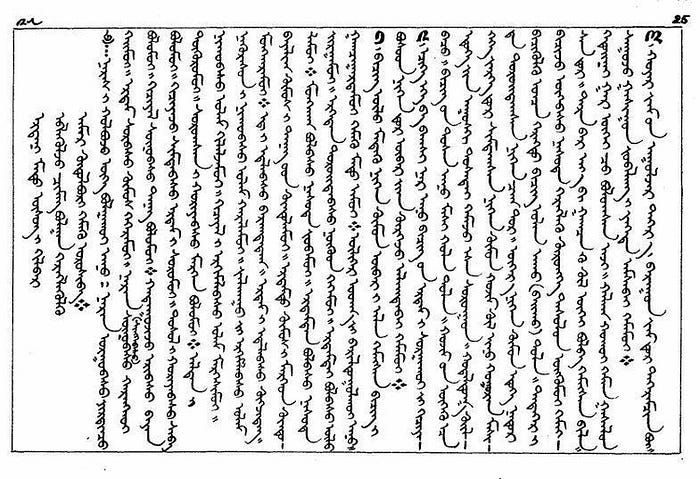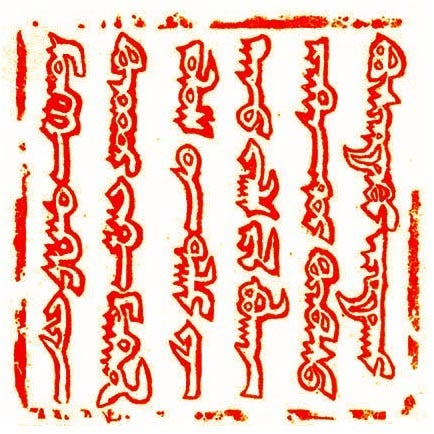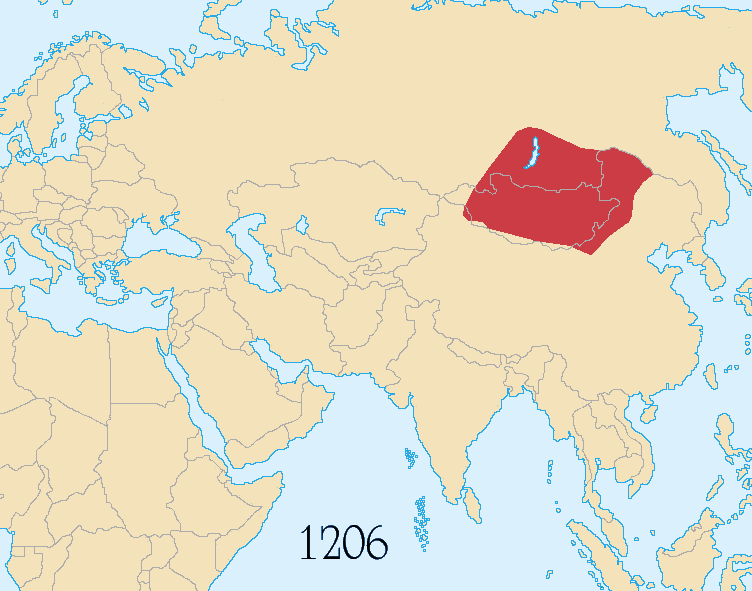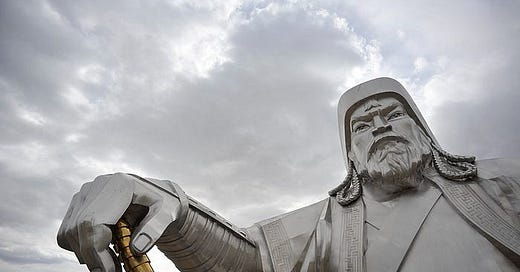The Best Threatening Letters Written By The Mongol Empire
No one can send an angry note quite like a Kahn
What’s the most threatening note you ever received in your life? Perhaps something from the Internal Revenue Service? A cease-and-desist letter from a lawyer? Maybe a court summons? Then again, it might have been something a little more sinister.
Now, imagine for a second you live far from society — out of reach of any kind of police or army — and you receive a letter. It comes from some backwoods neighbors. They’re a rough and scary lot, covered in tattoos, drive motorcycles, and have enough firepower to blow a hole in a mountain.
The patriarch claims God has given his tribe the authority to conquer the world and you are to submit immediately. In his exact words:
“Hasten your reply before the fire of war is kindled. Resist and you will suffer the most terrible catastrophes. We will shatter your sacred places and reveal the weakness of your God and then will kill your children and your old men together. At present you are the only enemy against whom we have to march.”
A little more terrifying than the lawyer’s letter, huh? But it’s not a thought experiment. That’s an actual piece of a letter a Mongol leader sent to a neighbor.
While the name “Mongol” may bring images of horses and arrows to mind, they also had a way with the written word. In fact, they sent many letters. They even had their own postal system called the Yām.
According to Jack Weatherford’s book Genghis Khan and the Making of the Modern World, their messengers could travel over 120 miles a day. These horsemen carried a “modified Uighur script”. The Mongols turned the original text from horizontal to vertical and read it from left to right, making it their own.

This strange text eventually found its way to neighbors in their ever- expanding empire. Read today, they’re interesting. However, in their time, they likely inspired bone-shaking terror. As you’ll soon see.
Dressing Down The Caliph Of Baghdad
“…Previously we have advised you, and we do so again now: refrain from rancor and obstinacy, do not attempt what you cannot do nor ignore what is manifest, for you will be sorry…When I lead my army against Baghdad in fury, whether you hide in the heavens or on earth.”
“I will bring you down from the spinning spheres; I will toss you in the air like a lion. I will leave no one alive in your realm; I will burn your city and your lands. If you wish to spare yourself and your venerable family, listen to my advice with the ear of intelligence. If you do not, you will see what God has willed.” — Conquest of Baghdad (1258) by Rashid al-Din Fazlallah (d. 1318), Letter from Hülegü Khan to al-Musta’sim
While the exact letter may be lost to history. The Muslim noble Rashid al-Din Fazlallah was in Baghdad at the time this letter was delivered and documented it. The Caliph ignored its words. According to Eamonn Gearon at the Great Courses, the city was the greatest in the world during the period.
However, al-Musta’sim the Caliph of Baghdad instigated Genghis Kahn’s anger for not sending troops when they were requested. After all, the Abbasid Caliphate was supposed to be a vassal. In reply, the great Kahn sent an army led by his grandson, Hülegü.
The Mongol army sacked the city, killing most of the inhabitants or making slaves of them. In addition, they destroyed most of the notable buildings and countless works of art. The devastation shocked the Muslim world. It was such a blow, Gearon notes it likely ended the Golden Age of Islam.
The damage was so complete to Baghdad some parts of the city were not fully repaired until the twentieth century. As Azeem Beg Chughtai puts it in the The Annual of Urdu Studies:
“Baghdad was a bride among cities, a beautiful and sophisticated metropolis where, for five hundred years, the Abbasid caliphate had collected the wealth, culture and luxury of the world. This was the Baghdad that Hulegu destroyed.”
Mongols And Their European Pen Pals
The Muslim world wasn’t alone in feeling the wrath of the Mongols. Europe also got their turn. In his scholarly article The Unstoppable Horde: The Mongol Conquest of Hungary, Peter Konieczny explains after the death of Genghis Kahn in 1227, the idea of global domination became “their mantra”.
After decimating Russia, Genghis’s grandson Batu began conquering a nomadic steppe people called the Qipchaqs or Cumans. Their refugees ran to Hungary. King Bela IV allowed them to move into his land if they converted to Christianity and swore loyalty. The Mongols didn’t approve and sent a letter around 1240.
“I have learned that you keep the Qipchaqs, my slaves, under your protection…Do not keep them with you, and…Do not make me your enemy on their account. For it is easier for them to escape than you. Since they, having no house and continually on the move with their tents may possibly escape. But you, living in houses and possessing fortresses and cities, how can you flee from my grasp?”
The letter asked for submission of the Hungarians, which of course didn’t happen. Their fate followed that of Baghdad. At some point afterwards, the Pope actually sent the Mongol Kahn a letter. This note asked why the Mongols chose to slaughter the Hungarians, along with their neighbors.
It also instructed the Kahn to immediately convert to Christianity. Yup, not a good idea. Güyük Khan, the leader of the Mongols at the time replied with a terrifying letter of course.
“…You wonder at so great a slaughter of men, especially of Christians and in particular Poles, Moravians and Hungarians…Because they did not obey the word of God and the command of Chingis Chan and the Chan, but took council to slay our envoys, therefore God ordered us to destroy them and gave them up into our hands. For otherwise if God had not done this, what could man do to man?
But you men of the West believe that you alone are Christians and despise others. But how can you know to whom God deigns to confer His grace? But we worshipping God have destroyed the whole earth from the East to the West in the power of God. Therefore if you accept peace and are willing to surrender your fortresses to us, You Pope and Christian princes, in no way delay coming to me to conclude peace and then we shall know that you wish to have peace with us.
But if you should not believe our letters and the command of God nor hearken to our counsel then we shall know for certain that you wish to have war. After that we do not know what will happen, God alone knows.”

The Mongols also wrote a long letter to the King of France, which was passed on by a few monks who visited their court. The letter meandered a bit. However, in Mongol fashion, it also reminded the French far distances, mountains, and oceans wouldn’t protect them if the Kahn’s forces chose to move — best to send their envoys immediately. Would you expect anything less?
The Song Dynasty Receives A Letter
Somewhere in about 1260 or so, the newly elected Kublai Kahn sent a letter to the Song Dynasty. The Mongols had been battling with them for years. The Chinese empire put up a pretty stiff resistance, however, their enemy believed they were directed by heaven to conquer the world.
So, the new Kahn sent a letter explaining their position was impossible. The only sensible thing to do was to surrender. As always, the Mongols had a colorful way of saying this.
“That your four borders lack even a flimsy defense, and your six armies have the might of broken bamboo, are things that everyone knows, and there is no need to raise every point [concerning your weaknesses] at this time…If you complete the rituals of subservience then naturally you will have an everlasting alliance [with us].”
“If, however, you worry that your position will be difficult to pass on [to your descendants] and you think of the many methods of trickery and so fail to take any action and are content to break off dialogue, then please repair and dredge your walls and moats…to await the provisioning of horses and arming of soldiers which we will raise in large numbers.”
“As for the climate, we are not at all afraid if it is hot and pestilential; as for the terrain, the rivers and oceans are all things about which we have become knowledgeable…Your survival or destruction will be decided at once, and Heaven alone knows how much farther our strength will extend afterwards. ”
“Disaster is up to you, to choose [or reject]; here there is nothing of which you can complain. [Incumbent] upon us is the utmost sincerity which can be maintained; [incumbent] upon you is to rely on whatever you choose. Do not follow precedent and merely write empty words [in reply].”
A Bloody Literary Tradition

While the image of the Mongols throughout history may be one of war and terror, one might want to add pen and ink. Strangely, a letter usually crossed a border before their horses.
These notes are a time capsule into their mind. It’s also a shear indicator of why the Mongol Empire lasted so long and conquered so much.
It was a tribe and family who believed God had given them the right to conquer the world. Oddly, they passed this belief down to their children. Then, those children passed it on as well, and further down the extensive family tree.
They created their own written history — conveniently called The Secret History of the Mongols — which was passed to each succeeding Kahn to remind them of this directive from heaven. They also illuminated their neighbors to this idea by letter and their eventual destruction.
-Originally posted on Medium 10/11/21



